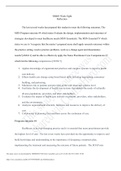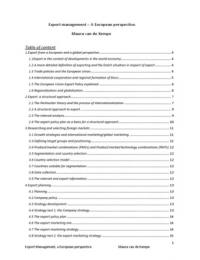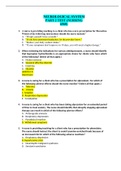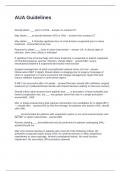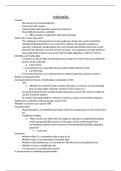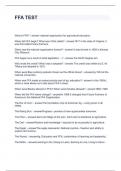CH1: Operations and processes (Direct: steering operations processes)
- What is operations process management?
o The activity of managing the resources and processes that produce (some mix
of) products and services, applicable for all types of businesses.
- What is a process?
o An activity or collection of actions/activities with a specific purpose, turning
input into output. (the white box = ops and processes)
,Not only about production/manufacturing, also about service.
- Primary processes
o 1. Purchasing (procurement / buying)
o 2. Production (Ops, manufacturing, transformation, making)
o 3. Logistics (transports, warehousing, labelling, moving)
o 4. Marketing
o 5. Sales and service
- Secondary processes (supporting activities) (dependent on company, i.e., law firm)
o 1. HRM
o 2. Administration, finance
o 3. R&D
o 4. Communications
o 5. ICT
o 6. Legal affairs
o 7. Facility management
,Transforming goods, from inputs, to outputs. Transformation will hopefully provide money,
and value. Not as much waste.
- Adding value: the value chain
o Michael porter (management guru)
o Value (or competitive advantage) is added mainly through primary processes.
o Porters value chain below:
- Why should you understand your (primary mainly) processes?
o Understanding processes gives insight in the essence of the company. (or its
performance, or its values, or its competitive advantage)
o Thorough analysis will enable making processes:
▪ 1. More efficient (doing things right, the first time)
▪ 2. More effective (doing the right, value adding, things)
▪ 3. More manageable (employee participation or empowerment; see
employees as assets not costs)
Three levels of analysis:
1. Supply network (strategic level)
2. The operation (the functions of the business (production, MKT, HRM, etc.)
3. The process (operational level, input-transformation-output system)
,
- What is operations process management?
o The activity of managing the resources and processes that produce (some mix
of) products and services, applicable for all types of businesses.
- What is a process?
o An activity or collection of actions/activities with a specific purpose, turning
input into output. (the white box = ops and processes)
,Not only about production/manufacturing, also about service.
- Primary processes
o 1. Purchasing (procurement / buying)
o 2. Production (Ops, manufacturing, transformation, making)
o 3. Logistics (transports, warehousing, labelling, moving)
o 4. Marketing
o 5. Sales and service
- Secondary processes (supporting activities) (dependent on company, i.e., law firm)
o 1. HRM
o 2. Administration, finance
o 3. R&D
o 4. Communications
o 5. ICT
o 6. Legal affairs
o 7. Facility management
,Transforming goods, from inputs, to outputs. Transformation will hopefully provide money,
and value. Not as much waste.
- Adding value: the value chain
o Michael porter (management guru)
o Value (or competitive advantage) is added mainly through primary processes.
o Porters value chain below:
- Why should you understand your (primary mainly) processes?
o Understanding processes gives insight in the essence of the company. (or its
performance, or its values, or its competitive advantage)
o Thorough analysis will enable making processes:
▪ 1. More efficient (doing things right, the first time)
▪ 2. More effective (doing the right, value adding, things)
▪ 3. More manageable (employee participation or empowerment; see
employees as assets not costs)
Three levels of analysis:
1. Supply network (strategic level)
2. The operation (the functions of the business (production, MKT, HRM, etc.)
3. The process (operational level, input-transformation-output system)
,




